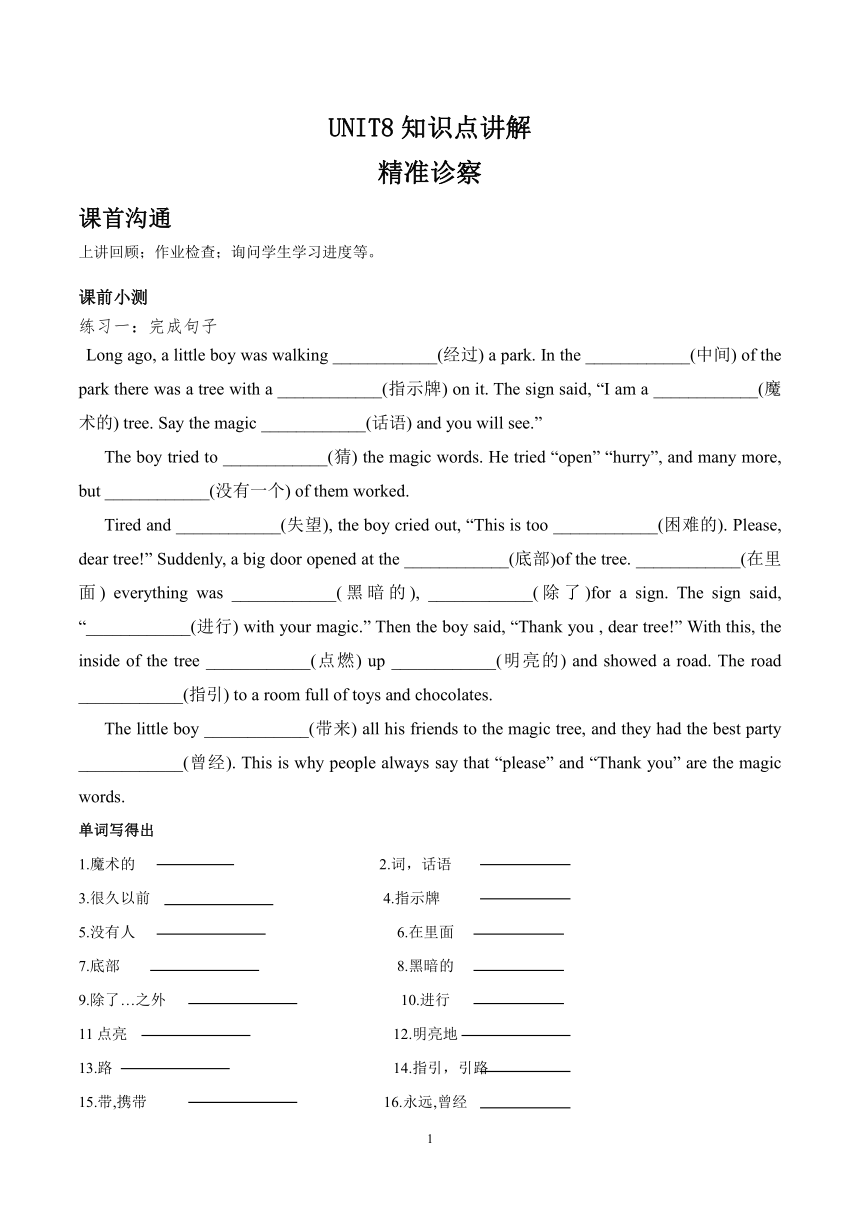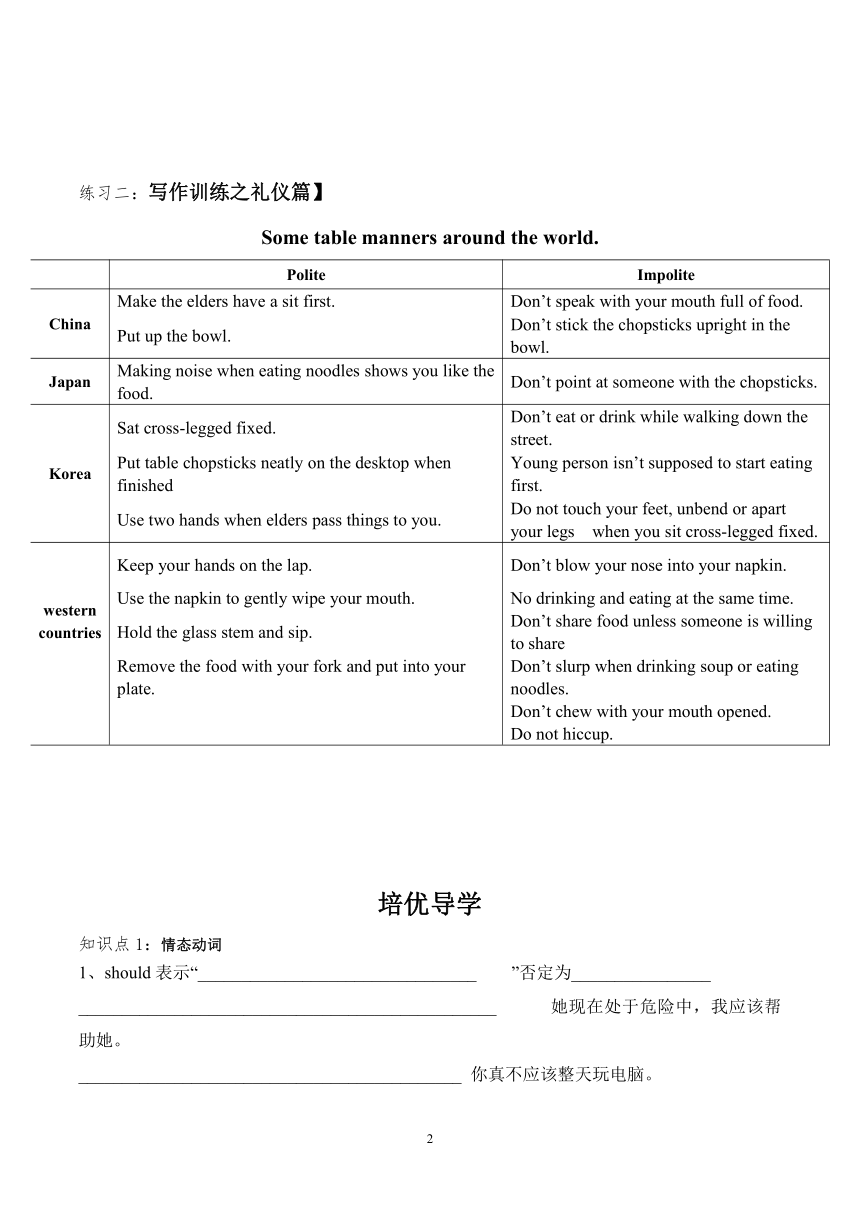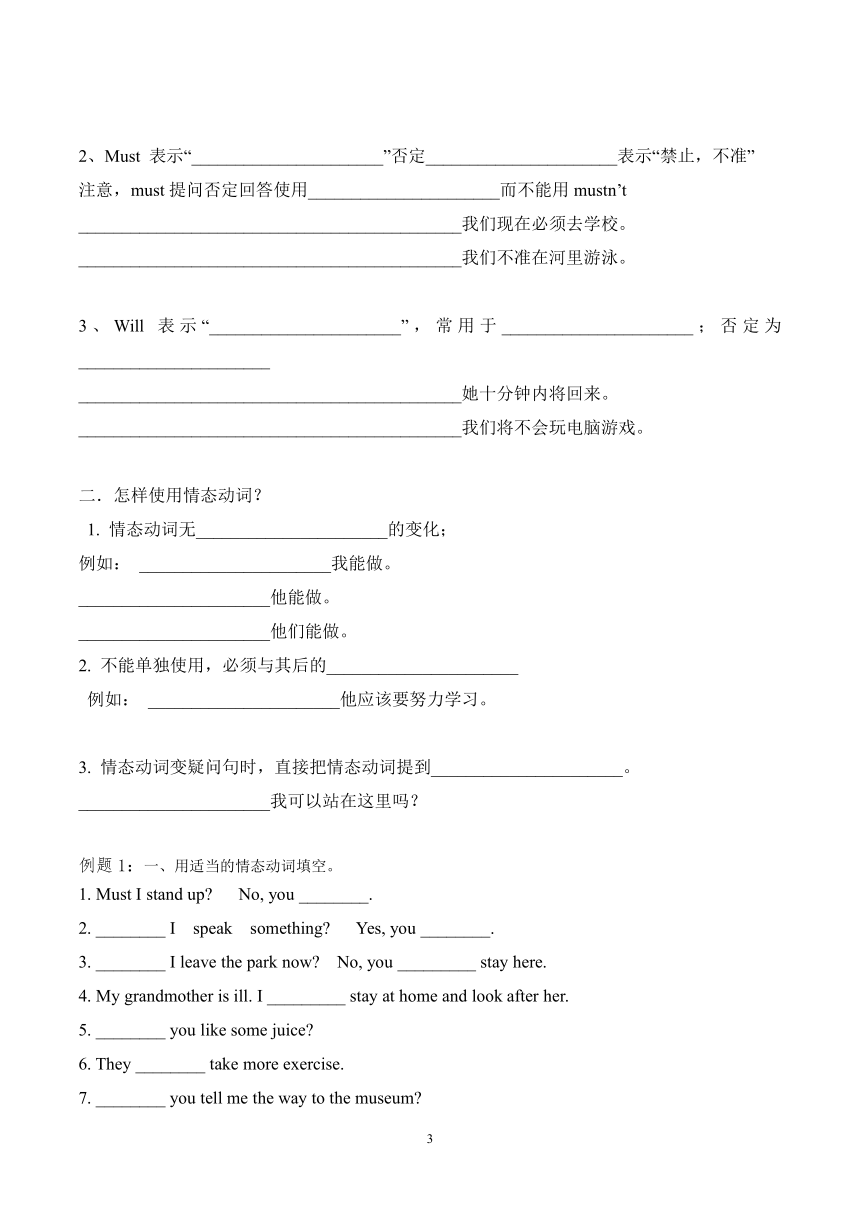Module 4 Unit 8 The magic words知识点讲解与练习(无答案)
文档属性
| 名称 | Module 4 Unit 8 The magic words知识点讲解与练习(无答案) |

|
|
| 格式 | zip | ||
| 文件大小 | 101.2KB | ||
| 资源类型 | 教案 | ||
| 版本资源 | 教科版(广州) | ||
| 科目 | 英语 | ||
| 更新时间 | 2021-05-13 00:00:00 | ||
图片预览



文档简介
UNIT8知识点讲解
精准诊察
课首沟通
上讲回顾;作业检查;询问学生学习进度等。
课前小测
练习一:完成句子
Long
ago,
a
little
boy
was
walking
____________(经过)
a
park.
In
the
____________(中间)
of
the
park
there
was
a
tree
with
a
____________(指示牌)
on
it.
The
sign
said,
“I
am
a
____________(魔术的)
tree.
Say
the
magic
____________(话语)
and
you
will
see.”
The
boy
tried
to
____________(猜)
the
magic
words.
He
tried
“open”
“hurry”,
and
many
more,
but
____________(没有一个)
of
them
worked.
Tired
and
____________(失望),
the
boy
cried
out,
“This
is
too
____________(困难的).
Please,
dear
tree!”
Suddenly,
a
big
door
opened
at
the
____________(底部)of
the
tree.
____________(在里面)
everything
was
____________(黑暗的),
____________(除了)for
a
sign.
The
sign
said,
“____________(进行)
with
your
magic.”
Then
the
boy
said,
“Thank
you
,
dear
tree!”
With
this,
the
inside
of
the
tree
____________(点燃)
up
____________(明亮的)
and
showed
a
road.
The
road
____________(指引)
to
a
room
full
of
toys
and
chocolates.
The
little
boy
____________(带来)
all
his
friends
to
the
magic
tree,
and
they
had
the
best
party
____________(曾经).
This
is
why
people
always
say
that
“please”
and
“Thank
you”
are
the
magic
words.
单词写得出
1.魔术的
2.词,话语
3.很久以前
4.指示牌
5.没有人
6.在里面
7.底部
8.黑暗的
9.除了…之外
10.进行
11点亮
12.明亮地
13.路
14.指引,引路
15.带,携带
16.永远,曾经
练习二:写作训练之礼仪篇】
Some
table
manners
around
the
world.
Polite
Impolite
China
Make
the
elders
have
a
sit
first.
Don’t
speak
with
your
mouth
full
of
food.
Put
up
the
bowl.
Don’t
stick
the
chopsticks
upright
in
the
bowl.
Japan
Making
noise
when
eating
noodles
shows
you
like
the
food.
Don’t
point
at
someone
with
the
chopsticks.
Korea
Sat
cross-legged
fixed.
Don’t
eat
or
drink
while
walking
down
the
street.
Put
table
chopsticks
neatly
on
the
desktop
when
finished
Young
person
isn’t
supposed
to
start
eating
first.
Use
two
hands
when
elders
pass
things
to
you.
Do
not
touch
your
feet,
unbend
or
apart
your
legs
when
you
sit
cross-legged
fixed.
western
countries
Keep
your
hands
on
the
lap.
Don’t
blow
your
nose
into
your
napkin.
Use
the
napkin
to
gently
wipe
your
mouth.
No
drinking
and
eating
at
the
same
time.
Hold
the
glass
stem
and
sip.
Don’t
share
food
unless
someone
is
willing
to
share
Remove
the
food
with
your
fork
and
put
into
your
plate.
Don’t
slurp
when
drinking
soup
or
eating
noodles.
Don’t
chew
with
your
mouth
opened.
Do
not
hiccup.
培优导学
知识点1:情态动词
1、should表示“________________________________
”否定为________________
________________________________________________
她现在处于危险中,我应该帮助她。
____________________________________________
你真不应该整天玩电脑。
2、Must
表示“______________________”否定______________________表示“禁止,不准”
注意,must提问否定回答使用______________________而不能用mustn’t
____________________________________________我们现在必须去学校。
____________________________________________我们不准在河里游泳。
3、Will
表示“______________________”,常用于______________________;否定为______________________
____________________________________________她十分钟内将回来。
____________________________________________我们将不会玩电脑游戏。
二.怎样使用情态动词?
1.
情态动词无______________________的变化;
例如:
______________________我能做。
______________________他能做。
______________________他们能做。
2.
不能单独使用,必须与其后的______________________
例如:
______________________他应该要努力学习。
3.
情态动词变疑问句时,直接把情态动词提到______________________。
______________________我可以站在这里吗?
例题1:一、用适当的情态动词填空。
1.
Must
I
stand
up?
No,
you
________.
2.
________
I
speak
something?
Yes,
you
________.
3.
________
I
leave
the
park
now?
No,
you
_________
stay
here.
4.
My
grandmother
is
ill.
I
_________
stay
at
home
and
look
after
her.
5.
________
you
like
some
juice?
6.
They
________
take
more
exercise.
7.
________
you
tell
me
the
way
to
the
museum?
8.
The
watch
________
tell
us
the
right
time.
9.
________
you
like
to
go
boating
with
us?
10.
________
we
play
chess
next
weekend?
小试牛刀:找出划线部分读音不同的单词。
(
)1.A.month
B.
sixth
C.
with
D.
birthday
(
)2.A.he
B.
egg
C.
dress
D.
bed
(
)3.A.duck
B.
much
C.
music
D.
lunch
(
)4.A.go
B.
hot
C.
not
D.
coffee
(
)5.A.room
B.
school
C.
look
D.
goose
按要求改写句子。
1.
She
can
walk
quickly.
I
________
________quickly
.
(否定句)
2.
You
have
to
finish
the
work
now.(一般疑问句)
________
I
the
work
now?
No,
you
________.
3.
They
can
paint
the
wall
well.
(一般疑问句)
_______
they
______
the
wall
well?
4.
Tom
must
carry
the
box
into
the
room.
(否定句)
Tom
________
________
carry
the
box
into
the
room.
5.
She
should
reach
the
station
early.
(否定句)
She
_______
_______
reach
the
station
early.
A.
in
B.
from
C.
for
D.
at
E.
on
F.
with
G.
save
H.
helping
I.
feed
1.
Thanks
you
for
___________
me
with
my
homework.
2.Don’t
buy
any
other
things.
We
need
to
___________some
money
for
tomorrow.
3.Thanks
a
lot
________
telling
me
the
way
to
the
hotel.
4.My
brother
can’t
wait
to
_________the
rabbits.
5.Janit
is
___________
the
UK.
Of
course
she
can
speak
English.
6.Which
cities
are
you
going
to
see
when
you
are
______
China?
7.I’ll
meet
you
_____
September,
1st.
8.When
will
you
arrive
___________the
railway
station?
9.Guangzhou
is
famous
________
its
delicious
food?
10.I
am
going
to
buy
a
new
coat
for
myself
__________that
money.
能力展示
一、知识回顾
马上就要下课啦、这节课你有什么收获吗?赶紧动笔、动脑筋把它写下来吧
课后作业
一、选出下列问题的正确答案,把字母编号写在问题前的括号内。
(
)1.
When
were
you
born?
(
)2.How
do
you
feel
when
you
saw
a
snake?
(
)3.
What
happened
to
the
tree
last
night?
(
)4.
What
are
you
doing
now?
(
)5.Where
were
you
born?
A.
I
was
born
on
September
2.
1997.
B.
I
am
doing
nothing.
C.
It
was
broken.
D.
I
felt
afraid.
E.
I
was
born
in
Guangdong.
六、阅读理解
The
old
name
for
films
was
‘‘
moving
pictures’’.
In
America
they
still
call
them
"movies"
and
they
say,
"Shall
we
go
to
the
movies?"
when
we
want
to
say,
"Shall
we
go
to
the
cinema?"
Then
one
day,
a
boy
said
to
his
friend,
"Do
you
like
moving
pictures?"
the
friend
thought(以为)
that
the
boy
was
going
to
invite
(邀请)him
to
go
to
the
cinema,
so
he
said,
"Yes,
please.
I
like
moving
pictures
very
much."
"Good,"
said
the
first
boy,
"My
father
has
a
picture
shop.
He
sells
pictures.
This
evening
I
have
to
move
(搬)
fifty
heavy
boxes
of
pictures
from
one
place
to
another.
You
like
moving
pictures,
so
I'm
sure
you
enjoy
moving
the
pictures
with
me."
(
)
6.
"Moving
pictures"
was
the
old
name
______
.
A.
for
pictures
B.
for
films
C.
for
America
D.
for
carrying
movies
(
)
7.
______
still
call
films
"movies"
today.
A.
The
boys
B.
The
British
C.
The
Americans
D.
Young
people
(
)
8.When
the
boy
said
to
his
friend,
"Do
you
like
moving
pictures?"
he
meant(意思是)"___".
A.
Do
you
like
to
go
to
the
cinema
with
me?
B.
Do
you
like
to
see
the
film?
C.
Do
you
like
to
help
me
move
the
pictures?
D.
Do
you
like
old
films?
(
)
9.
The
boy's
friend
______
A.
liked
seeing
films
very
much.
B.
liked
to
move
pictures
very
much.
C.
was
always
ready
to
help
others.
D.
liked
to
help
people
move
something.
(
)
10.
The
boy's
father's
job
was
to
______.
A.
show
films
B.
make
films
C.
sell
pictures
D.
draw
pictures
Dick
lives
in
New
York.
His
parents
have
a
shop
there.
He’s
seven
years
old
and
begins
to
go
to
school
this
autumn.
It’s
far
from
their
shop
and
his
father
drives
a
car
to
take
him
to
school
every
day.
So
he’s
never
late
for
school
and
his
teachers
like
him.
It’s
Friday
today.
Miss
White
is
teaching
the
students
to
count
from
one
to
ten.
Dick
is
working
hard.
Soon
he
can
count
them.
Miss
White
is
happy
and
asks,
“How
many
people
are
there
in
your
family,
Dick?”
Dick
stands
up
and
says,
“Two,
Miss
White.”
“Who
are
they?”
“My
parents.”
“Oh?”
Miss
White
is
surprised(惊奇的),
“There
are
three
people
in
your
family!”
“But
now
I’m
not
at
home,
I’m
at
school,
you
know!”
says
Dick.
根据文章内容判断下列句子正(T)误(F)。
(
)
1.
Dick
is
in
Grade
Two.
(
)
2.
Dick
can’t
count
from
one
to
ten
today,
so
Miss
White
isn’t
happy.
(
)
3.
Dick
works
hard
at
school.
(
)
4.
There
are
three
people
in
Dick’s
family
(
)
5.
Dick
goes
to
school
by
bus.
课后指导
完成课后作业
记课本单词以及课文
整理这节课的笔记
精准诊察
课首沟通
上讲回顾;作业检查;询问学生学习进度等。
课前小测
练习一:完成句子
Long
ago,
a
little
boy
was
walking
____________(经过)
a
park.
In
the
____________(中间)
of
the
park
there
was
a
tree
with
a
____________(指示牌)
on
it.
The
sign
said,
“I
am
a
____________(魔术的)
tree.
Say
the
magic
____________(话语)
and
you
will
see.”
The
boy
tried
to
____________(猜)
the
magic
words.
He
tried
“open”
“hurry”,
and
many
more,
but
____________(没有一个)
of
them
worked.
Tired
and
____________(失望),
the
boy
cried
out,
“This
is
too
____________(困难的).
Please,
dear
tree!”
Suddenly,
a
big
door
opened
at
the
____________(底部)of
the
tree.
____________(在里面)
everything
was
____________(黑暗的),
____________(除了)for
a
sign.
The
sign
said,
“____________(进行)
with
your
magic.”
Then
the
boy
said,
“Thank
you
,
dear
tree!”
With
this,
the
inside
of
the
tree
____________(点燃)
up
____________(明亮的)
and
showed
a
road.
The
road
____________(指引)
to
a
room
full
of
toys
and
chocolates.
The
little
boy
____________(带来)
all
his
friends
to
the
magic
tree,
and
they
had
the
best
party
____________(曾经).
This
is
why
people
always
say
that
“please”
and
“Thank
you”
are
the
magic
words.
单词写得出
1.魔术的
2.词,话语
3.很久以前
4.指示牌
5.没有人
6.在里面
7.底部
8.黑暗的
9.除了…之外
10.进行
11点亮
12.明亮地
13.路
14.指引,引路
15.带,携带
16.永远,曾经
练习二:写作训练之礼仪篇】
Some
table
manners
around
the
world.
Polite
Impolite
China
Make
the
elders
have
a
sit
first.
Don’t
speak
with
your
mouth
full
of
food.
Put
up
the
bowl.
Don’t
stick
the
chopsticks
upright
in
the
bowl.
Japan
Making
noise
when
eating
noodles
shows
you
like
the
food.
Don’t
point
at
someone
with
the
chopsticks.
Korea
Sat
cross-legged
fixed.
Don’t
eat
or
drink
while
walking
down
the
street.
Put
table
chopsticks
neatly
on
the
desktop
when
finished
Young
person
isn’t
supposed
to
start
eating
first.
Use
two
hands
when
elders
pass
things
to
you.
Do
not
touch
your
feet,
unbend
or
apart
your
legs
when
you
sit
cross-legged
fixed.
western
countries
Keep
your
hands
on
the
lap.
Don’t
blow
your
nose
into
your
napkin.
Use
the
napkin
to
gently
wipe
your
mouth.
No
drinking
and
eating
at
the
same
time.
Hold
the
glass
stem
and
sip.
Don’t
share
food
unless
someone
is
willing
to
share
Remove
the
food
with
your
fork
and
put
into
your
plate.
Don’t
slurp
when
drinking
soup
or
eating
noodles.
Don’t
chew
with
your
mouth
opened.
Do
not
hiccup.
培优导学
知识点1:情态动词
1、should表示“________________________________
”否定为________________
________________________________________________
她现在处于危险中,我应该帮助她。
____________________________________________
你真不应该整天玩电脑。
2、Must
表示“______________________”否定______________________表示“禁止,不准”
注意,must提问否定回答使用______________________而不能用mustn’t
____________________________________________我们现在必须去学校。
____________________________________________我们不准在河里游泳。
3、Will
表示“______________________”,常用于______________________;否定为______________________
____________________________________________她十分钟内将回来。
____________________________________________我们将不会玩电脑游戏。
二.怎样使用情态动词?
1.
情态动词无______________________的变化;
例如:
______________________我能做。
______________________他能做。
______________________他们能做。
2.
不能单独使用,必须与其后的______________________
例如:
______________________他应该要努力学习。
3.
情态动词变疑问句时,直接把情态动词提到______________________。
______________________我可以站在这里吗?
例题1:一、用适当的情态动词填空。
1.
Must
I
stand
up?
No,
you
________.
2.
________
I
speak
something?
Yes,
you
________.
3.
________
I
leave
the
park
now?
No,
you
_________
stay
here.
4.
My
grandmother
is
ill.
I
_________
stay
at
home
and
look
after
her.
5.
________
you
like
some
juice?
6.
They
________
take
more
exercise.
7.
________
you
tell
me
the
way
to
the
museum?
8.
The
watch
________
tell
us
the
right
time.
9.
________
you
like
to
go
boating
with
us?
10.
________
we
play
chess
next
weekend?
小试牛刀:找出划线部分读音不同的单词。
(
)1.A.month
B.
sixth
C.
with
D.
birthday
(
)2.A.he
B.
egg
C.
dress
D.
bed
(
)3.A.duck
B.
much
C.
music
D.
lunch
(
)4.A.go
B.
hot
C.
not
D.
coffee
(
)5.A.room
B.
school
C.
look
D.
goose
按要求改写句子。
1.
She
can
walk
quickly.
I
________
________quickly
.
(否定句)
2.
You
have
to
finish
the
work
now.(一般疑问句)
________
I
the
work
now?
No,
you
________.
3.
They
can
paint
the
wall
well.
(一般疑问句)
_______
they
______
the
wall
well?
4.
Tom
must
carry
the
box
into
the
room.
(否定句)
Tom
________
________
carry
the
box
into
the
room.
5.
She
should
reach
the
station
early.
(否定句)
She
_______
_______
reach
the
station
early.
A.
in
B.
from
C.
for
D.
at
E.
on
F.
with
G.
save
H.
helping
I.
feed
1.
Thanks
you
for
___________
me
with
my
homework.
2.Don’t
buy
any
other
things.
We
need
to
___________some
money
for
tomorrow.
3.Thanks
a
lot
________
telling
me
the
way
to
the
hotel.
4.My
brother
can’t
wait
to
_________the
rabbits.
5.Janit
is
___________
the
UK.
Of
course
she
can
speak
English.
6.Which
cities
are
you
going
to
see
when
you
are
______
China?
7.I’ll
meet
you
_____
September,
1st.
8.When
will
you
arrive
___________the
railway
station?
9.Guangzhou
is
famous
________
its
delicious
food?
10.I
am
going
to
buy
a
new
coat
for
myself
__________that
money.
能力展示
一、知识回顾
马上就要下课啦、这节课你有什么收获吗?赶紧动笔、动脑筋把它写下来吧
课后作业
一、选出下列问题的正确答案,把字母编号写在问题前的括号内。
(
)1.
When
were
you
born?
(
)2.How
do
you
feel
when
you
saw
a
snake?
(
)3.
What
happened
to
the
tree
last
night?
(
)4.
What
are
you
doing
now?
(
)5.Where
were
you
born?
A.
I
was
born
on
September
2.
1997.
B.
I
am
doing
nothing.
C.
It
was
broken.
D.
I
felt
afraid.
E.
I
was
born
in
Guangdong.
六、阅读理解
The
old
name
for
films
was
‘‘
moving
pictures’’.
In
America
they
still
call
them
"movies"
and
they
say,
"Shall
we
go
to
the
movies?"
when
we
want
to
say,
"Shall
we
go
to
the
cinema?"
Then
one
day,
a
boy
said
to
his
friend,
"Do
you
like
moving
pictures?"
the
friend
thought(以为)
that
the
boy
was
going
to
invite
(邀请)him
to
go
to
the
cinema,
so
he
said,
"Yes,
please.
I
like
moving
pictures
very
much."
"Good,"
said
the
first
boy,
"My
father
has
a
picture
shop.
He
sells
pictures.
This
evening
I
have
to
move
(搬)
fifty
heavy
boxes
of
pictures
from
one
place
to
another.
You
like
moving
pictures,
so
I'm
sure
you
enjoy
moving
the
pictures
with
me."
(
)
6.
"Moving
pictures"
was
the
old
name
______
.
A.
for
pictures
B.
for
films
C.
for
America
D.
for
carrying
movies
(
)
7.
______
still
call
films
"movies"
today.
A.
The
boys
B.
The
British
C.
The
Americans
D.
Young
people
(
)
8.When
the
boy
said
to
his
friend,
"Do
you
like
moving
pictures?"
he
meant(意思是)"___".
A.
Do
you
like
to
go
to
the
cinema
with
me?
B.
Do
you
like
to
see
the
film?
C.
Do
you
like
to
help
me
move
the
pictures?
D.
Do
you
like
old
films?
(
)
9.
The
boy's
friend
______
A.
liked
seeing
films
very
much.
B.
liked
to
move
pictures
very
much.
C.
was
always
ready
to
help
others.
D.
liked
to
help
people
move
something.
(
)
10.
The
boy's
father's
job
was
to
______.
A.
show
films
B.
make
films
C.
sell
pictures
D.
draw
pictures
Dick
lives
in
New
York.
His
parents
have
a
shop
there.
He’s
seven
years
old
and
begins
to
go
to
school
this
autumn.
It’s
far
from
their
shop
and
his
father
drives
a
car
to
take
him
to
school
every
day.
So
he’s
never
late
for
school
and
his
teachers
like
him.
It’s
Friday
today.
Miss
White
is
teaching
the
students
to
count
from
one
to
ten.
Dick
is
working
hard.
Soon
he
can
count
them.
Miss
White
is
happy
and
asks,
“How
many
people
are
there
in
your
family,
Dick?”
Dick
stands
up
and
says,
“Two,
Miss
White.”
“Who
are
they?”
“My
parents.”
“Oh?”
Miss
White
is
surprised(惊奇的),
“There
are
three
people
in
your
family!”
“But
now
I’m
not
at
home,
I’m
at
school,
you
know!”
says
Dick.
根据文章内容判断下列句子正(T)误(F)。
(
)
1.
Dick
is
in
Grade
Two.
(
)
2.
Dick
can’t
count
from
one
to
ten
today,
so
Miss
White
isn’t
happy.
(
)
3.
Dick
works
hard
at
school.
(
)
4.
There
are
three
people
in
Dick’s
family
(
)
5.
Dick
goes
to
school
by
bus.
课后指导
完成课后作业
记课本单词以及课文
整理这节课的笔记
同课章节目录
- Module 1 Stories
- Unit 1 Slow and steady wins the race
- Unit 2 Waiting for another hare
- Module 2 Animals
- Unit 3 What animal is it?
- Unit 4 We can save the animals
- Module 3 Famous people
- Unit 5 Dr Sun Yatsen
- Unit 6 Steve Jobs
- Module 4 Good manners
- Unit 7 It's the polite thing to do
- Unit 8 The magic words
- Module 5 Travel abroad
- Unit 9 Where will you go?
- Unit 10 I can't wait to see you
- Module 6 Let's look back
